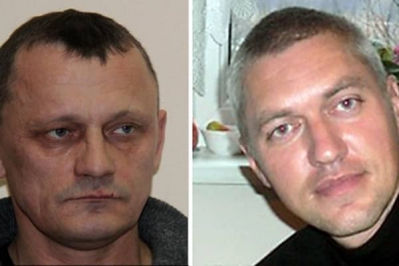Alibis as inadmissible evidence in Russia’s ‘trial’ of tortured Ukrainians
 Mykola Karpyuk, Stanislav Klykh
Mykola Karpyuk, Stanislav Klykh
The judge in the trial of Mykola Karpyuk and Stanislav Klykh has refused to include material confirming that neither man was in Chechnya 20 years ago when Russia claims they fought against Russian soldiers. The court has demonstrated the same disregard for Memorial Human Rights Centre analyses which show that the entire case against the two Ukrainians is an incompetent fabrication.
This trial is different from all the others against Ukrainians held illegally in Russia in that a jury is involved. There has been enormous effort throughout the proceedings to prevent defence witnesses testifying and to manipulate the information which the jury receives. Both of the defendants have also been prevented from attending over supposed infringement of procedure, and there are grounds for concern over Klykh’s state of health due to the psychotropic drugs forced on him. The court has twice deferred the court debate, which is now scheduled for May 11.
Ukrainian civic activist Maria Tomak has accompanied members of the two men’s families to Chechnya and played a major role in gathering vital evidence. She points out that there is documentary evidence demonstrating that 42-year-old Klykh was at Kyiv University and in Dec 1994 – Jan 1995 being tested on his coursework. There are numerous witnesses who can confirm that 51-year-old Karpyuk was in Rivne, looking after his dying mother.
Tomak explains that only relatives were willing to actually come to Chechnya to give testimony, since others not surprisingly were worried for their own safety. Around 20 people did, however, give testimony on video, and it was this video from March 21 that the judge refused to include in the case material. Tomak and Euromaidan SOS have organized a kind of flash mob, asking people to send the video address to any friends they have in Chechnya to get its message across.
Even if the videoed testimony were deemed unacceptable, everything has shown up the flaws in this case.
The two men were held incommunicado for 10 months in Klykh’s case and 18 in Karpyuk’s. As soon as they received proper lawyers, they retracted all ‘confessions’ given and said that they had been signed under terrible torture. Both men give consistent accounts of their torture and still bear the scars of it. The court has nonetheless refused to add the allegations to the case, and there has been no investigation into them. Applications have now been sent to the European Court of Human Rights, added to the case.
The only ‘evidence’, aside from their retracted confessions, comes from the testimony of a Ukrainian national who was already serving a 23-year sentence in a Russian prison over a violent robbery. Alexander Malofeyev is a drug addict, HIV-positive and suffering from hepatitis and tuberculosis. Even if no physical violence was applied, he could easily be manipulated by the threat to deprive him of life-supporting medication.
‘Confessions’ cannot clash with verifiable facts yet in this case the entire indictment has been demolished by the Memorial HRC, which has been closely following events in Chechnya for well over 20 years. Some of the men’s ‘confessions’ were to entirely fictitious ‘crimes’. No charges were laid against the men, indicating clearly that the investigators understood that they were fiction. They were, however, left in the indictment, meaning that the horrific details of invented crimes were heard by the jury. Memorial is convinced that this was a deliberate attempt to influence jury members.
Memorial has also demonstrated that of the 30 men whom Karpyuk and Klykh are supposed to have killed, 18 were killed in another place altogether, while a further 11 did not die from gunshot wounds, as the prosecution claims.
There were extraordinary allegations made by the head of the Russian Investigative Committee Alexander Bastrykin regarding this case, with Bastrykin claiming that the then Ukrainian prime minister Arseny Yatsenyuk and many other prominent Ukrainians had also been fighting in Chechnya. All of this nonsense was eagerly passed on by Russian propaganda media, while arousing mirth and humorous memes on social networks.
There was already likely to be less media attention to a trial held in Grozny, Chechnya. Then in March 2016, Chechen leader Ramzan Kadyrov’s hired thugs were deployed in attacking human rights activists and in trying to prevent witnesses from attending the Karpyuk – Klykh trial.
The ploy has been to deter observers and to block the emergence of vital testimony, just as Memorial’s analysis of the historically inaccurate facts, and evidence that the men were never in Chechnya. It was probably hoped that journalists would become bogged down in details about the allegations and the First Chechen War 20 years ago, mentioning only that the men themselves deny the charges.
It is doubtless also hoped that the jury can also be deceived and distracted from the simple facts that prompted the Memorial Human Rights Centre to declare the men political prisoners and demand their release. The men were never in Chechnya and are therefore by definition innocent of crimes that also never took place.
Please write to the men - even a single sentence or two will send an important message both to them, and to the Russian authorities, that they are not forgotten.
The addresses: Mykola Karpyuk (in Russian Nikolai)
364037, г. Грозный, Ленинский р-он, ул. Кунта-Хаджи Кишиева, 2. Следственный изолятор №1, Карпюку, Николаю (1964)
Stanislav Klykh
364037, г. Грозный, Ленинский р-он, ул. Кунта-Хаджи Кишиева, 2. Следственный изолятор №1, Клыху, Станиславу (1974)
Or send your letters to post.rosuznik[at]gmail.com, a civic initiative helping to get mail to Russian-held political prisoners They will deal with writing the envelope and sending it on. .
If you are unable to write in Russian, the following would be quite sufficient:
Желаем здоровья, мужества и терпения, надеемся на скорое освобождение.
(we wish you good health, courage and patience and hope that you will soon be released).





